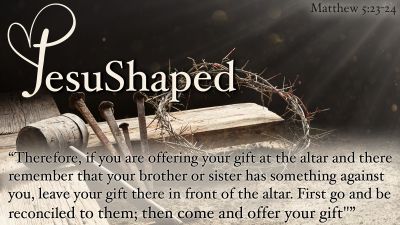Jesus pretty well shattered the illusion of compartmentalized worship - though most of the world still tries to cling to it - with his statement on the greatest commands, or what we're calling The Jesus Vibe. Jesus says we're called to love the Lord our God with all our hearts, souls, and minds just as we're called to love our neighbors just as we love ourselves.
Such comprehensive and personal love doesn't leave room for compartments. It's expansive and all-inclusive. My love for God demands every fiber of my being! My love for those around me should be as centered and focused on others' needs and wants as my own awareness is focused on my own needs and wants.
Just in case we miss this point, Jesus comes along and makes it even clearer when he says:
"Therefore, if you are offering your gift at the altar and there remember that your brother or sister has something against you, leave your gift there in front of the altar. First go and be reconciled to that person; then come and offer your gift" (Matthew 5:23-24 TNIV).
Put in cornbread English, God isn't going to accept anything we offer him - our hearts, our Sunday worship, our offerings, our praise, our hopes, our private prayers, our dreams - if we knowingly remain at odds with a brother or sister in Christ. The two loves in The Jesus Vibe are intricately connected. Loving God and loving each other are not options or choices or degrees of faithfulness: they are the two sides of the same coin. Without both, there is no coin. Without loving our fellow humans, we can't love God.
We can't be at a hostile impasse with a brother and sister in Christ whom we've seen and claim to love God whom we haven't seen (1 John 4:20). We won't be forgiven, if we are unforgiving (Matthew 6:14-15). If we are harsh in our judgment of others' hearts and motives, that same standard of harshness will be used to judge us (Matthew 7:1-2). In fact, Jesus tells the powerful story of "the unmerciful servant" to show how God detests those on whom he's lavishly showered forgiveness, but who in return hold on to debts and grudges toward others (Matthew 18:21-35). We can't praise God from a well poisoned by bitterness and cursing toward those made in his image (James 3:9-12).
Our standard of love, grace, and forgiveness is simple: we are to forgive as lavishly, completely, and graciously as we have been forgiven (Ephesians 4:32). We are to be merciful just as our Father, whom we claim to love, is merciful (Luke 6:36). Jesus sums it up with this simple, but comprehensive demand we call "The Golden Rule": "So in everything, do to others what you would have them do to you, for this sums up the Law and the Prophets" (Matthew 7:12).
As I read back through the previous paragraphs, I'm struck with the strong, universal emphasis in these passages. They're comprehensive. They're without exception. They cover every area of our lives. There is no room to compartmentalize and separate our lives into work, home, hobby, and church. The Jesus Vibe must be the background music of our lives in every place, with each person, and tuned to God's standard and beat to God's rhythm at all times.
In hearing this, I'm also struck with two realities - one earthbound and the other heavenly.
First, despite my commitment to live this vibe, I find it hard to be as forgiving and gracious as God. Forgiveness and compassion are hard work if they move beyond special events and permeate the daily fabric of my life. I realize that the best I can offer God is my intent to be forgiving, my commitment to make it real in my daily life, and my confession of failure to him when I find myself lagging in this regard. With a profound humility I have to cry out to him and say, "Father, I can't do this without your help!"
Second, it is in these moments of honesty, intention and commitment that my Lord comes and reminds me that he has given me his power and presence to help my life be tuned by The Jesus Vibe:
And hope does not put us to shame, because God's love has been poured out into our hearts through the Holy Spirit, who has been given to us (Romans 5:5).
What makes it so hard for us to forgive when we've been forgiven so much?
What helps you to forgive others when you've been wronged or hurt severely?
I'd love to get your response on my blog:












Comments
Have thoughts on this article? Leave a comment